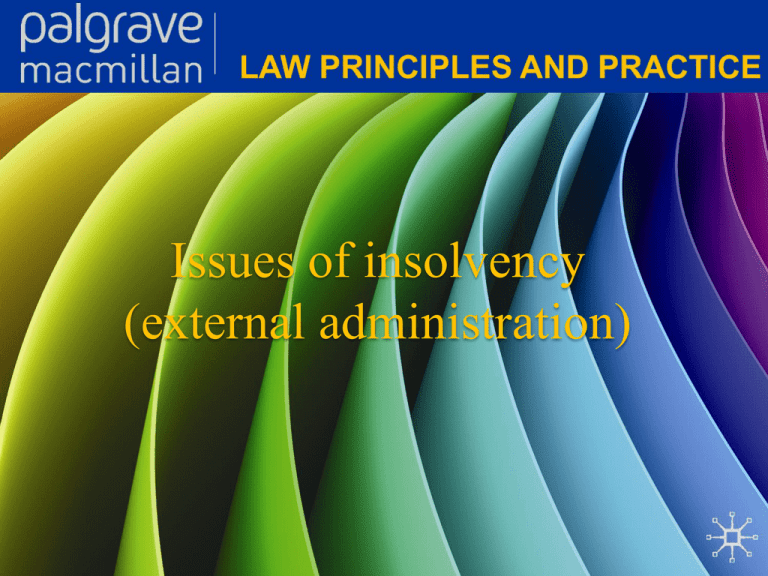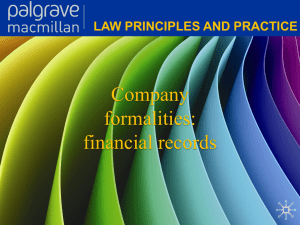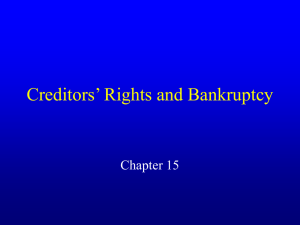Corporations Act
advertisement

Issues of insolvency (external administration) Corporate Law: Law principles and practice Issues of insolvency (external administration) A company may seek external or outside administration for various reasons. For example: • • • The company may need restructuring. The directors may fear that the company is insolvent and they will be liable if they allow the company to keep trading. The creditors may force the company into external administration. Corporate Law: Law principles and practice General insolvency issues The directors of a company may enter into voluntary administration when the company appears to have no prospect of paying its creditors and is insolvent. Directors will be personally liable if they allow the company to continue trading without a reasonable belief that the company can repay its debts and obligations (Corporations Act 2001 (Cth) s 588G). Corporate Law: Law principles and practice Companies in distress If a company cannot pay its creditors (e.g. the tax office, suppliers and employees) it is considered to be in distress. Creditors can force an involuntary administration by appointing a qualified liquidator. If an external administrator is appointed under administration procedures, then a moratorium period occurs and creditors must await an orderly distribution of assets. Corporate Law: Law principles and practice Corporations Amendment (Insolvency) Act 2007 (Cth) This Act was designed to: • • • • improve returns to creditors introduce greater regulation of insolvency professionals deter improper company conduct introduce changes to the voluntary administration system. Corporate Law: Law principles and practice Signs of insolvency ASIC suggests the following signs that a company might be nearing insolvency: • • • • • • • • • ongoing losses poor cash flow the absence of a business plan incomplete financial records or disorganised internal accounting procedures lack of cash-flow forecasts and other budgets increasing debt (liabilities are greater than assets) problems selling stock or collecting debts unrecoverable loans have been made to associated parties creditors are unpaid outside usual terms Corporate Law: Law principles and practice The creditors of the company Any party who is owed money by a company is a creditor (e.g. employees, the ATO, suppliers). Secured creditors: creditors who, in supplying credit, have received some official claim over the assets of the company in a documented form, which allows those creditors to seize assets under a contractual right. Secured creditors are paid before unsecured creditors. Corporate Law: Law principles and practice How does a company come to an end? Compulsory wind-up A company may be wound up by court order: • because it breached some order or law • because it is no longer trading • because it has not commenced business • because it has no members • for any reason that is just and equitable to wind up the company (Corporations Act 2001 (Cth) s 461). A company is normally wound up because of a compulsory order (e.g. a creditor has not been paid). A creditor, a contributory, a director and ASIC must have leave from court to apply for a winding up, but must demonstrate that the company is insolvent to receive an order (s 459P(3)). Corporate Law: Law principles and practice Compulsory wind-up cont … The parties that can apply for a compulsory winding up under pt 5.4 of the Corporations Act 2001 (Cth) include: • • • • • • • the company itself any creditor with an enforceable claim against the company a contributory, defined in s 9 as a member of the company who has fully paid up shares or may be liable to contribute in the event of the winding up a director of the company a liquidator ASIC a prescribed body, such as a regulatory body as per the regulations. Corporate Law: Law principles and practice Compulsory wind-up cont … Winding up by a court commences on the day the order was made (Corporations Act 2001 (Cth) s 513A). A liquidator can be appointed (s 472). The liquidator must be officially registered and consent to the appointment. The winding-up order binds all unsecured creditors and contributories (s 471(1)) and suspends any court actions or enforcement processes against the company (unless a court decides otherwise (s 471B)). Secured creditors can seize property over which they have a charge or mortgage (s 471C). Corporate Law: Law principles and practice Compulsory wind-up cont … A court can order a stay to a wind-up and return control to the company before a company deregistration (Corporations Act 2001 (Cth) s 482). A company remains a legal entity while being wound up (s 493(1)) and can still operate its business, subject to the liquidator’s recommendations about disposal of property (s 477). Any improper disposal of property by the company is void (s 468). A company must state that it is in liquidation on its public documents and negotiable instruments (s 541). Corporate Law: Law principles and practice Compulsory wind-up cont … There is a (rebuttable) presumption of insolvency under an application for compulsory winding up (Corporations Act 2001 (Cth) s 459C(1)): • • • • when seeking an order under oppression (s 234) where a named party under s 459P can apply for a wind-up under s 459A (a creditor, a contributory, a director, a liquidator, a shareholder and ASIC) under the grounds stated in s 461 and s 462(2) by various parties (ASIC, creditors and liquidators) as a result of an investigation by ASIC (s 464). Corporate Law: Law principles and practice Compulsory wind-up cont … Under s 459C(2) of the Corporations Act 2001 (Cth), a court must presume that the company is insolvent if during or after the three months ending on the day when the application was made: • • • • • the company fails to meet a statutory demand (s 459F); or an order or decree (etc) from the court is returned wholly or partially unsatisfied; or a receiver is appointed; or an order has been made to appoint a receiver; or a person enters into possession or assumes control of property. Corporate Law: Law principles and practice Voluntary wind-up The members may undertake the wind-up because they want a return of capital, or the company cannot continue to trade profitably. Members can commence the wind-up without a court order, but with a special resolution (Corporations Act 2001 (Cth) s 491). There must be a meeting of creditors within 24 hours (s 497). A statement of the company’s affairs must be made and lodged with ASIC (s 497(5)). The directors must declare that the company is solvent and can pay its debts in the next 12 months before proceeding (s 494(1)) or they will be personally liable. Corporate Law: Law principles and practice Voluntary wind-up cont … Under s 601AA of the Corporations Act 2001 (Cth), an application to deregister can be lodged with ASIC by the company, director, member or liquidator if: • • • • • all members agree the company is not carrying on business the company’s assets are worth less than $1000 the company has no outstanding liabilities there is no other party to any legal proceedings. Corporate Law: Law principles and practice Voluntary wind up cont … If a liquidator is appointed in a voluntary winding up and forms an opinion that the company is unable to pay its debs within 12 months, then the winding up proceeds as a creditor’s winding up (Corporations Act 2001 (Cth) s 496(1)). If a company fails to meet a creditor’s statutory demand, the creditors can determine that the company is insolvent and wind it up. The directors of a company may declare the company is unable to meet its debts (on reasonable grounds) and should be wound up. Corporate Law: Law principles and practice Voluntary wind-up cont … The directors must call a meeting of members and put a special resolution that the company should be wound up, and then appoint a liquidator. A meeting of creditors must be convened and sufficient information given so they can determine what to do. The creditors can accept the liquidator appointed, or appoint their own (Corporations Act 2001 (Cth) s 499). Corporate Law: Law principles and practice Insolvency A company is deemed to be insolvent when it is unable to pay its debts as they fall due (Corporations Act 2001 (Cth) s 95A). The deeming of insolvency on a company is usually triggered when a company cannot meet a demand made by a creditor requiring a payment that the company cannot make. This is determined by cash flow. Bell Group Ltd (in liq) v Westpac Banking Corporation (No 9) (2008) 70 ACSR 1 Insolvency must be judged both by current debts and prospective claims. Corporate Law: Law principles and practice Insolvency cont … A company may be determined to have been insolvent in the past if, under s 588E of the Corporations Act 2001 (Cth): • • • the company has been found, or could be presumed to be, insolvent at some point in time in the previous 12 months to the winding up in a ‘relation back’ the company has not kept appropriate financial records as per s 286(1), unless the company can show that its records were deliberately destroyed, removed or concealed by another party (s 588E(6)) the company was found to be insolvent under separate recovery proceedings, it will be presumed to be insolvent under current proceedings. Corporate Law: Law principles and practice Insolvency cont … Directors must make a solvency declaration in the annual financial reports. Failure to make a declaration indicates a presumption of insolvency (Corporations Act 2001 (Cth) s 459C). Corporate Law: Law principles and practice The statutory demand If a creditor claims that a company is insolvent they must serve a statutory demand on the company (Corporations Act 2001 (Cth) s 459E), specifying the amount of the debts, which must be a minimum of $2000. The demand must be in writing in a prescribed form, signed and attached to an affidavit with the requirement that payment be made within 21 days (s 459E). Corporate Law: Law principles and practice The statutory demand cont … The creditor making the demand must prove certain conditions before proceeding to court: • • • that the creditor has the right on receipt of payment to validly discharge the debt that the debt must be absolutely due and presently payable so that the creditor legally (without doubt) is entitled to claim immediate payment that the debt must have existed when the statutory demand was served on the company (Corporations Act 2001 (Cth) s 459G). Corporate Law: Law principles and practice The statutory demand cont … A court must consider if there is a genuine dispute or if there is an issue of an offsetting claim (Corporations Act 2001 (Cth) s 459H). A court may set aside the statutory demand on various grounds (s 459G–N) (e.g. if there is a defect in the demand, if it would result in injustice, or if the demand likely to be dismissed). Corporate Law: Law principles and practice The winding-up process in court Under s 459Q of the Corporations Act 2001 (Cth), if an application for a company to be wound up in insolvency relies on a failure by the company to comply with a statutory demand, the application: (a) must set out particulars of service of the demand on the company and of the failure to comply with the demand; and (b) must have attached to it: (i) a copy of the demand; and (ii) if the demand has been varied by an order under subsection 459H(4)—a copy of the order; and Corporate Law: Law principles and practice The winding-up process in court cont … (c) unless the debt, or each of the debts, to which the demand relates relates is a judgment debt—must be accompanied by an affidavit that: (i) verifies that the debt, or the total of the amounts of the debts, is due and payable by the company; and (ii) complies with the rules. Corporate Law: Law principles and practice The winding-up process in court cont … A defect or irregularity in an application will not lead to its dismissal, unless it would result in a substantial injustice that cannot be remedied. Any such application must be served within 14 days of the winding-up order. A court can use its discretion not to make a winding-up order (Corporations Act 2001 (Cth) ss 459A, 467). A court can make any type of order it sees fit (s 467(1)). Corporate Law: Law principles and practice The winding-up process in court cont … A court should make a determination as to whether the winding up should take place within six months of an application (Corporations Act 2001 (Cth) s 459R). Normally, any application after that time will be dismissed (s 459R(3)). If a company fails to comply with the statutory demand, it can only object to the application on the grounds that the company is solvent (s 459S(2)). Corporate Law: Law principles and practice External administration External administration refers to the situation whereby a suitably qualified outsider takes control of a company in order to assess (and possibly resolve) its financial difficulties. A company may go into administration on a voluntary basis because the directors believe the company is insolvent, the members resolve to do this or creditors force the administration. Corporate Law: Law principles and practice External administration cont … A company may be wound up or enter a deed of arrangement with the creditors to keep the company going (e.g. through a compromise or arrangement with the creditors, or by reorganising the company in some way). The person organising any deed (such as a receiver, voluntary administrator or liquidator) as an external administrator needs to be registered, qualified and experienced (Corporations Act 2001 (Cth) s 1282). Corporate Law: Law principles and practice The process of voluntary administration If the directors of a company believe a company is insolvent, or have reasonable grounds to believe that it is likely to become insolvent (s 436A(1)), they must call a meeting and appoint an administrator, or they are in danger of breaching their directors’ duties by allowing a company to trade while insolvent (Corporations Act 2001 (Cth) s 588G). An administrator may be appointed by a liquidator or provisional liquidator (s 436B), or a chargee (s 436C). Directors can appoint an administrator without the approval of shareholders, creditors or needing to attend court to receive permission (s 436A(1)). Corporate Law: Law principles and practice The process of voluntary administration cont … The appointment of an administrator means that an external party assesses the company. The object of external administration is to, if possible, maximise the chances of continuing the business (Corporations Act 2001 (Cth) s 435A). Voluntary administration allows for negotiation and assessment with a minimum of formal hearings in court and creditors’ meetings. Administration commences with the appointment of a registered administrator, who must consent to their appointment and not be linked to the company (s 436A–C). Corporate Law: Law principles and practice The moratorium period Once voluntary administration is entered into, any legal action by creditors is stayed under a moratorium of up to a month until approval is given by the administrator or a court (Corporations Act 2001 (Cth) s 440D). The secured creditors cannot press any claim until they receive permission from the court or the administrator (ss 440A–J). Corporate Law: Law principles and practice Administrators’ advice to the creditors The purpose of the administrator is to determine what is in the best interests of the creditors (and all parties involved) and to advise as to how best to achieve this (Corporations Act 2001 (Cth) s 435A). The administrator must investigate the affairs of the company. The administrator then recommends whether the company should continue trading, enter a deed or arrangement or if liquidation should take place (s 438A(b)). Corporate Law: Law principles and practice The first meeting of creditors Once the administrator is appointed, they must lodge certain notices with ASIC (e.g. a statement of the company’s affairs to be put to the first creditors’ meeting (Corporations Act 2001 (Cth) s 497(5)). All company documentation must state that the company is under administration. The administrator calls a meeting of creditors to determine the company’s future (there are strict time limits in which they must do this). The creditors of the company have the right to appoint a committee of creditors (s 436E). Corporate Law: Law principles and practice The first meeting of creditors cont … The administrator takes control of the company and manages its property (Corporations Act 2001 (Cth) ss 437A and 437B). The administrator has wide powers to do such things as remove directors, sell property and whatever is necessary to run the company business. Directors must report on the company’s business to the administrator. The powers of directors are suspended during the period of administration. Corporate Law: Law principles and practice The second meeting of creditors The administrator must, before the second meeting of creditors, investigate the affairs of the company (Corporations Act 2001 (Cth) s 438A(a)) and form an opinion on what should be done with the company (s 438A(b)). The administrator then advises the creditors at a meeting, having given appropriate notice of the meeting to the creditors (s 439A(4)(a)). Corporate Law: Law principles and practice The second meeting of creditors cont … At the second meeting of creditors, the creditors can discuss what the administrator has proposed and then vote on one of the options under s 439C of the Corporations Act 2001 (Cth): • • • that the company execute a deed of arrangement that the administration should end that the company be wound up. Corporate Law: Law principles and practice The second meeting of creditors cont … A deed of arrangement may be entered into. This provides a fixed period for the company to trade out its difficulties. The administrator must inform ASIC of any offences committed by officers within the company (Corporations Act 2001 (Cth) s 438). Administration ends with the winding up of the company. Corporate Law: Law principles and practice Liabilities of an administrator The administrator: • • • • • is personally liable for debts incurred in the course of the administration for services rendered, goods bought or property leased (Corporations Act 2001 (Cth) ss 443A(1), 443B); and is entitled to an indemnity out of the company’s property for these debts and their remuneration (ss 443D, 449E(1)) has a professional responsibility to use their judgement and may liable for negligence if they do not undertake their responsibilities appropriately has a right to be paid for their work has a responsibility to ensure taxation is paid on behalf of the company and its employees. Corporate Law: Law principles and practice The role of the court The court has a supervisory role in voluntary administration. Australasian Memory Pty Ltd v Brien (2000) 200 CLR 270 Corporate Law: Law principles and practice Receivership A receiver is appointed by the secured creditors to take control of company property in order to pay out those secured creditors; this is a form of external administration. The right to appoint a receiver is created by a contractual arrangement made by the creditor as part of providing credit or lending to the company. A default in the loan means a creditor invokes a contractual right to enforce their claim over company property, or to appoint a receiver to act on their behalf. Corporate Law: Law principles and practice Receivership cont … A receiver can be appointed under contract and without the need to go to court. A receiver who is privately appointed must act within the bounds of the contract of appointment, though they act in the interests of the creditor. A receiver may become a ‘controller’ of the company so that they control the assets of the company or, in fact, manage the company. A receiver may go on to become the liquidator of the company. The receiver (or liquidator) is an officer of the company and takes the requisite duties and liabilities attached to this. Corporate Law: Law principles and practice Receivership cont … When acting for debenture holders under a floating charge, the receiver must first pay any insurance monies owing (Corporations Act 2001 (Cth) ss 433(3), 562), then auditor’s fees, and then wages and leave entitlements up to $2000. Corporate Law: Law principles and practice Appointing a receiver A court can appoint a receiver at the request of creditors and lenders who do not have the power to privately appoint a receiver. A court-appointed receiver is an officer of the court (not of the company) and is responsible to the court (Corporations Act 2001 (Cth) s 1323). The court must supervise the receiver (s 423). The court-appointed receiver must consider the competing claims of creditors and determine who has priority, the ultimate distribution being made by the court Corporate Law: Law principles and practice Appointing a receiver cont … Once a receiver is appointed: • • notice must be placed in the Government Gazette ASIC and the ATO must be informed. The receiver: • • can be a receiver manager and must be a registered liquidator must not be associated with the company as an officer of creditor. The directors no longer manage the company (though they remain as a board). Corporate Law: Law principles and practice Receivership Receivership does not impose a moratorium on creditors. Secured creditors will take priority, though some unsecured creditors (e.g. employees and superannuants can still claim. Receivership may end with the appointment of a liquidator. The liquidator, if appointed, looks after the interests of all creditors, not just the secured creditors. Corporate Law: Law principles and practice The receiver’s powers and duties The receiver has a common law duty to act in good faith (Downsview Nominees Ltd v First City Corp Ltd (1993) 11 ACLC 3101) and to take reasonable steps to determine appropriate value and to advertise for prospective buyers (Pendlebury v Colonial Mutual Life Assurance Society Ltd (1912) 13 CLR 676). Corporate Law: Law principles and practice The receiver’s powers and duties cont … The receiver, once appointed, must act in good faith under statute and their power of appointment; a receiver can seek directions from a court if unsure of what they need to do. A receiver appointed by a court is an officer of the court, while a receiver appointed by secured creditors is an officer of the company. Corporate Law: Law principles and practice The receiver’s powers and duties … The duties and liabilities of company receivers are prescribed in s 420A of the Corporations Act 2001 (Cth), which sets out some 23 different powers available to a receiver. A receiver can ask for further information from officers. The receiver must lodge a copy of their report with ASIC. A receiver must report any offences or negligence to ASIC (s 422). Corporate Law: Law principles and practice The receiver’s powers and duties cont … The administrative duties of a receiver include: • • • • • • opening a bank account and keeping accounting records Corporations Act 2001 (Cth) s 421) notifying the company of their appointment (s 429(2)) preparing a report about the company’s affairs (s 421A) within two months of their appointment ascertaining the priority of payment of debts (s 433) determining their own costs, expenses and fees (s 425) providing notification of their appointment (s 429(2)). Corporate Law: Law principles and practice Liability of receivers Under s 419(1) of the Corporations Act 2001 (Cth), a receiver (acting as agent for the parties appointing them) who takes possession or assumes control of property to enforce a charge is not personally liable for debts incurred in the course of the receivership (s 419(1)). Corporate Law: Law principles and practice Termination If the company is terminated and the creditors paid out, the receiver’s role is finished. A court can end the receivership if there is misconduct or if a liquidator applies to have them removed. Corporate Law: Law principles and practice Receiver managers A receiver has the role of taking possession of the company’s assets so that they can be sold off and creditors paid out. A receiver merely receives the rents or income and pays the outgoings, but does not manage the company. A receiver manager is specifically appointed with powers of management under a private deed or contract. If a receiver manager is appointed by a court, they are an officer of the company and report back to the court, rather than creditors (Corporations Act 2001 (Cth) s 90). Corporate Law: Law principles and practice Liquidators A liquidator may be appointed to locate and take possession of company assets, and to protect them for the creditors. Under s 477(1)(a) of the Corporations Act 2001 (Cth), a liquidator may carry on the business for the beneficial disposal or winding up of the business. A liquidator may come to an arrangement with the creditors, but generally they liquidate the assets and pay out competing claims of creditors according to law (s 477). Corporate Law: Law principles and practice Qualifications of a liquidator A liquidator must have certain qualifications to be appointed. A court-appointed liquidator must be registered as an official liquidator with ASIC in addition to simply registering as a liquidator. The liquidator must be a natural person, with the appropriate accounting qualifications necessary to register as a liquidator with ASIC (Corporations Act 2001 (Cth) s 1282(3)), and not be associated as an officer or creditor of the company. Corporate Law: Law principles and practice Disqualifying a liquidator Certain persons will be disqualified from being appointed a liquidator, particularly those persons who are not independent of the company. Section 532(2) of the Corporations Act 2001 (Cth) lists persons who cannot be appointed, including any person owing the company more than $5000 or a creditor who is owed more than $5000. Other disqualified persons include insolvent persons, officers and auditors of the company (since they lack independence) and officers who have been prohibited from managing a company (ss 206B, 206E). Corporate Law: Law principles and practice Duties of a liquidator A liquidator is an officer and a fiduciary within the company in carrying out their role of gathering assets, indentifying liabilities and fulfilling statutory duties, which are in addition to those of an officer (Corporations Act 2001 (Cth) ss 179–184). A liquidator must gather in the assets, maintaining assets in a saleable form, selling off the assets and then paying out the creditors (s 478(1)). A liquidator uses their own discretion in administering and distributing company property (s 479). Corporate Law: Law principles and practice Duties of a liquidator cont … A liquidator has: • • • • extensive general powers (Corporations Act 2001 (Cth) s 477) 11 particular powers (listed in s 477(2)) certain delegated powers of the court (e.g. to hold meetings, to determine the wishes of creditors, to exercise power over the property, books and monies (s 530A–C) powers to access company books and obtain information from officers and employees (ss 477(3), 483(1), 530A). Corporate Law: Law principles and practice Duties of a liquidator cont … The liquidator must assess the company and prepare various reports on it (Corporations Act 2001 (Cth) s 476), and within two months of receiving a statement of the affairs from the directors and secretary (s 475), prepare a preliminary report as to the company’s position. The liquidator must call a meeting of creditors, if requested, to form a committee of creditors (s 548) and then call a final meeting when the company’s affairs are fully wound up (s 509). Corporate Law: Law principles and practice Duties of a liquidator cont … For a deregistered company, the liquidator must report to ASIC: • any offence (e.g. negligence, taking of company money, breach of directors’ duties) within six months of its occurrence • when the company is unable to pay its unsecured creditors more than 50 cents in the dollar (Corporations Act 2001 (Cth)s 533) The liquidator must lodge with ASIC every six months accounts in a prescribed form (Form 524), with a statement in writing that sets out receipts and payments, an aggregate amount, and statement of what has been done by the liquidator and amounts received from property disposed of (s 539(1)). Corporate Law: Law principles and practice Duties of a liquidator cont … The liquidator produces Form 524, which sets out: • • • • the particulars of ‘dividends’ to secured and unsecured creditors for the six-month period payments made to preferred creditors particulars of the rate per share on the return of assets in specie and/or cash to contributories an assessment of the current progress of the winding up. Corporate Law: Law principles and practice Duties of a liquidator cont … The liquidator will give notice to every creditor and contributory that the account has been made up when they next forward any report or notice of meeting, or notice of call or dividend (Corporations Act 2001 (Cth) s 539(5)). ASIC is given powers to have the Form 524 information audited by a registered company auditor (s 539(2)). The liquidator must give the auditor such books and information as they require (s 539(3)) and the liquidator is entitled to copy of that report given to ASIC (s 539(4)(a)). Corporate Law: Law principles and practice Alternatives to winding up The deed of company arrangement The administrator of a company may recommend to the creditors that instead of winding up the company that it enter a compromise or arrangement with its creditors (Corporations Act 2001 (Cth) ss 411–12), reconstruction, or merger with one or more companies (ss 413–14). The administrator is essentially putting a proposal that the company can keep trading and work through its financial problems. Corporate Law: Law principles and practice The deed of company arrangement cont … The administrator of the company is to be the administrator of the deed, unless the creditors appoint someone else to be administrator of the deed (Corporations Act 2001 (Cth) s 444A(2)). The administrator of the company must prepare an instrument setting out the terms of the deed (s 444A(3)). Corporate Law: Law principles and practice The deed of administration The deed will set out all the conditions of the administration (i.e. the start of administration, to what extent the company is released from its debts, the order in which the company will be released from its debts). The deed will bind the company, the members, its officers, its creditors and the administrator (Corporations Act 2001 (Cth) s 444D), although the deed does not prevent a secured creditor from pursuing their claims, unless that creditor voted in favour of the deed. The deed will be binding on all creditors, which includes all creditors to the company and not just those whose debts were payable under the deed (s 444A(4)(i)). Corporate Law: Law principles and practice The scheme of company arrangement A scheme of company arrangement (SCA) is similar, to a certain extent, to a deed of company arrangement made between the creditors and the company. A company may initiate an SCA when it fears that it is facing insolvency unless the company is somehow revamped. A solvent company may use an SCA to facilitate a merger or restructure of itself; this could be in place of using takeover provisions (Corporations Act 2001 (Cth) s 625). An SCA tends to be used less by insolvent companies because it involves complex steps of procedure by a court for a scheme to be approved. Corporate Law: Law principles and practice The scheme of company arrangement cont … An SCA is designed as a plan to save the company, which may include a restructure, merger or compromise with creditors. A scheme operates through s 411 of the Corporations Act 2001 (Cth). A party applies to a court for an order that a meeting be held for creditors to consider the scheme. Proper notice and information must be given. An explanatory statement must be given to the creditors (s 412). The scheme must be voted on and approved by 50% of creditors who hold 75% of the debts; the vote does not have to be unanimous. Corporate Law: Law principles and practice The scheme of company arrangement cont … A court has wide powers to make orders as they see fit (Corporations Act 2001 (Cth) s 413). The wide powers of the court overcome difficulties if a company constitution prevents changes, or a small number of dissenting members or creditors prevent the adoption of a scheme. A court essentially supervises the process and if it is satisfied that there is no discrimination, oppression or illegal behaviour, it will approve the scheme. Corporate Law: Law principles and practice Priority of debts A secured creditor has priority over other creditors and does not need to prove the debt when a company is being wound up, but can seize and sell secured assets. Some unsecured creditors, such as employees, will be paid in preference to other creditors (Corporations Act 2001 (Cth) s 433(3)(a)). If a creditor is not a secured creditor, they must prove their debt against the company in the event of a winding up (s 553). The order for repayment (of a dividend) is set out in ss 556–64. Corporate Law: Law principles and practice Priority of debts cont … Essentially, the liquidator will pay in the following order: • • • • • insurance monies owing (Corporations Act 2001 (Cth) ss 433(3), 562) administration expenses (liquidators, administrators and auditors)—in order to preserve, realise or get in the property of the company wages and leave entitlements up to $2000— employees’ entitlements are protected under pt 5.8A in a compulsory winding up, the legal costs of the applicant in obtaining the winding up order (s 556(1)(b)) unsecured creditors. Corporate Law: Law principles and practice Priority of debts cont … Employees are protected under s 596AA(1) of the Corporations Act 2001 (Cth), under which it is an offence to enter an agreement or transaction with the intention of reducing or defeating recovery of those entitlements (see also s 596AB(1)). Entitlements are broadly defined under s 596AA(2) and include wages, superannuation, compensation and leave payments. A liquidator can bring a compensation claim under s 566 since employees have a preferential debt. Corporate Law: Law principles and practice Pooling orders A liquidator can make a determination (a ‘pooling determination’) that a group of companies is a ‘pooled group’. The group becomes jointly and severally liable for each company’s debts and have their claims against each other extinguished (Corporations Act 2001 (Cth) ss 571(2)– (11)). Corporate Law: Law principles and practice Voidable transactions An external administrator has a duty to investigate transactions that were made prior to their appointment (antecedent transactions), which appear to have given some creditors preferential treatment to the disadvantage of other creditors (Corporations Act 2001 (Cth) pt 5.7B div 2). This process is referred to as ‘relation back’ or tracking of transactions prior to the appointment of the administrator. Corporate Law: Law principles and practice Voidable transactions cont … Improper transactions include: • • • undue preferences—the insolvent debtor has given money or property to one creditor in preference to other creditors who should have been paid first (Corporations Act 2001 (Cth) s 588FA); these are void against the liquidator if they were made six months before the bankruptcy occurred (s 565) payment of invalid floating charges uncommercial transactions—that is, selling property for less than what it is worth (s 588FB) Corporate Law: Law principles and practice Improper transactions cont … • • • insolvent transactions—this is an unfair preference given by the company or an uncommercial transaction of the company while the company is insolvent (Corporations Act 2001 (Cth) s 588FC) unfair loans—the interest and charges are extortionate according to the amount, terms and conditions of the loan (s 588FD) unreasonable director-related transactions—a payment or transfer of property or benefit to a director or associate is unreasonable when the circumstances are considered (s 588FDA). Corporate Law: Law principles and practice Voidable transactions cont … A court can make various orders in relation to voidable transactions (Corporations Act 2001 (Cth) s 588FF) in order to return the company to its original position if not for the voidable transaction. Court orders to void a transaction can apply to transactions made six months before the date of the winding up commenced. This is called a ‘relation back for an unfair preference’ (s 588FE(2)). If an insolvent transaction is also an uncommercial transaction, the transaction can be voided up to two years in a relation back ( s 588FE(3)). Corporate Law: Law principles and practice Voidable transactions cont … There are some defences under s 588FG of the Corporations Act 2001 (Cth) whereby a court will not make an order under s 588FF that materially prejudices a right or interest of a person other than a party to the transaction if it is proved that: • • the person received no benefit because of the transaction the person received the benefit in good faith (s 588FG), and at the time when the person received the benefit, the person had no reasonable grounds for suspecting that the company was insolvent or would become insolvent, and, as a reasonable person in these circumstances, would have had no such grounds for so suspecting.








